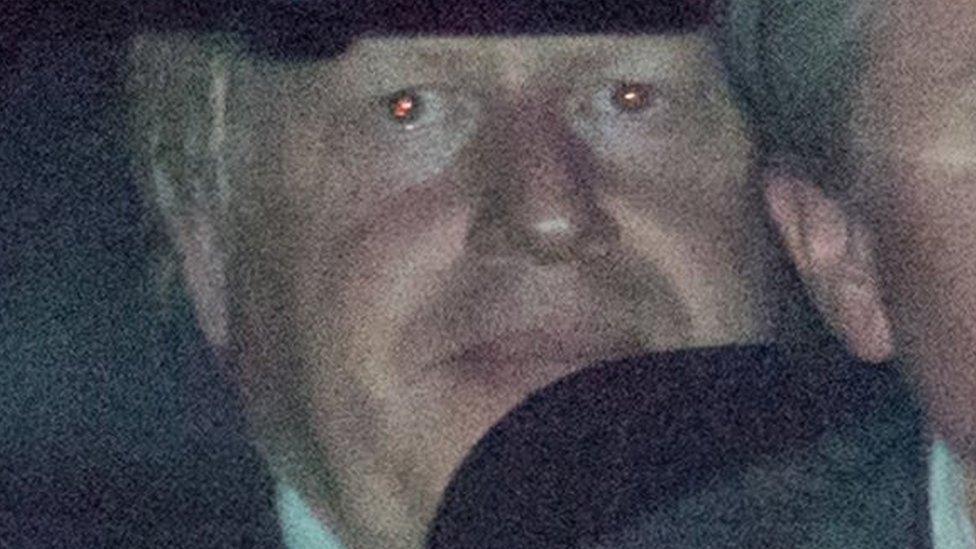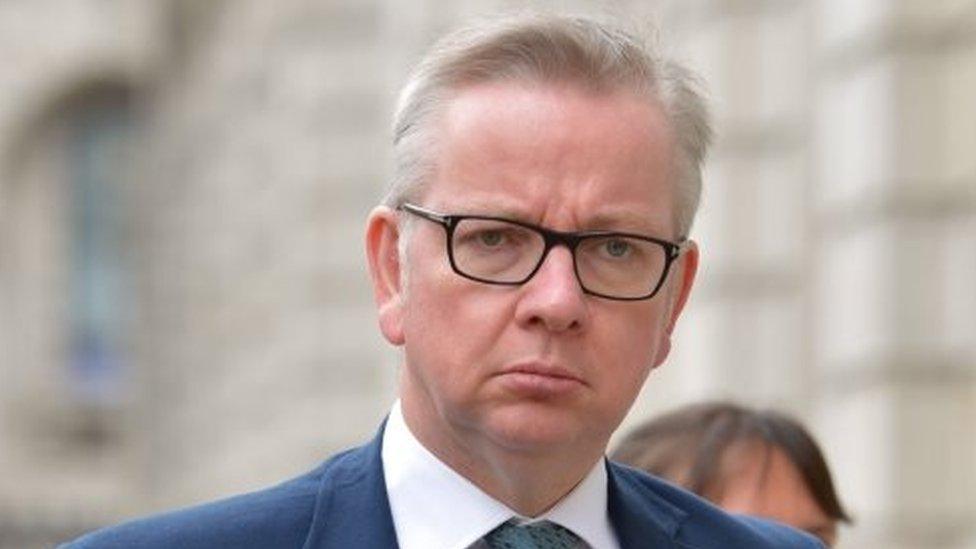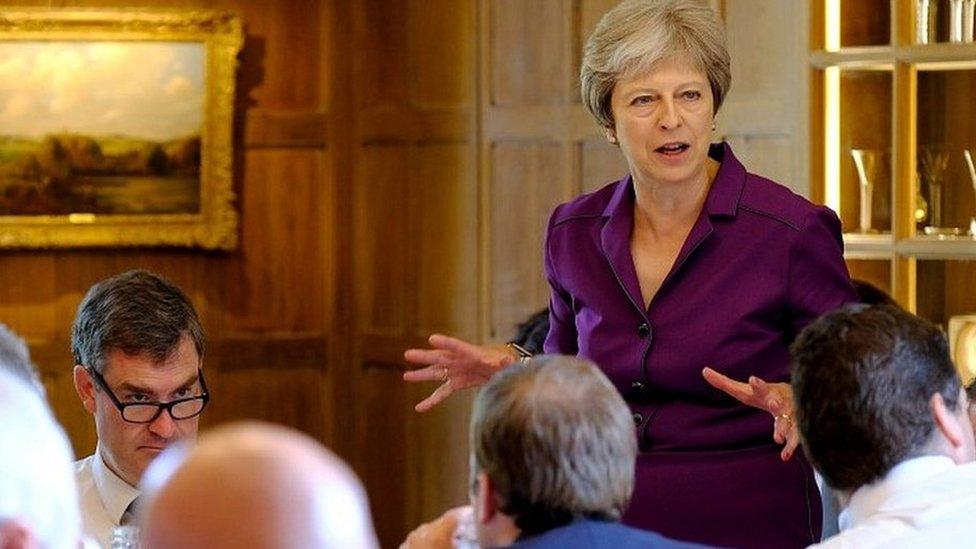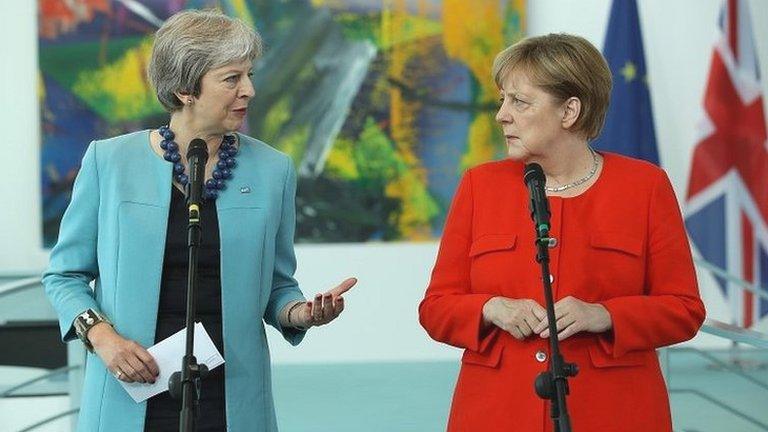Brexit: Tory tensions still profound despite cabinet deal
- Published
PM does not rule out preferential treatment for EU migrants
You can't resolve 40 years of differences with an extra 40 minutes.
The cabinet meeting on Friday to get the grumpy group on board with Theresa May's plan for Brexit ran a little longer than her team had hoped, by 40 minutes.
But now they are cock-a-hoop over what they achieved. Tensions in the Tory Party over Europe are still profound.
But the Brexiteers were subdued with some neat Whitehall manoeuvring, and strong political arguments in preparation.
Ministers this week received one paper explaining why a Canada-style trade deal couldn't work because it wouldn't prevent an Irish hard border.
Another then about why the Norway model, the European Economic Area, couldn't work.
A third paper too explaining how leaving with no deal might cause such an economic upset, that the Tories would be punished for a generation.
Then finally late on Thursday before the meeting - ta dah! - a paper proposing the magic solution, well at least the prime minister's compromise.
'Confronting reality'
That layering of arguments was repeated in real life by the sessions on Friday at Chequers.
Experts (they're back apparently) from government explained the problems with the models, and answered questions from the floor.
The idea was to illustrate to those present that, while they might have their own desires, in the end, they were not compatible with the government's priorities.
One cabinet minister described it as "confronting reality rather than the referendum slogans".
Then, voila, they were presented again with the prime minister's "evolved Mansion House" model, the only answer on offer on Friday aside from stalking out.
One of those present said there was an "overwhelming sense" in the room that "we just had to decide".

Sources say Boris Johnson "engaged on the substance" during the meeting
The middle ground in the cabinet - those who aren't on either ardent wing - were, it's said, tangibly determined to push for a decision with the prime minister more or less giving the impression to ministers that the only way to avoid taking part in that decision was to quit.
With the day designed as it was, only one seemingly workable plan was presented, so despite deep political division it was inevitably agreed.
One cabinet minister joked: "Put people in a room until they are so hot they will agree to anything."
But Friday's scorching temperatures were coincidental. The way the plan was made by Number 10 and their officials absolutely was not.
'Symbolic pushback'
Every member of the cabinet had their say. Not surprisingly, Brexteers Boris Johnson, Andrea Leadsom, David Davis and Esther McVey are said to have "moaned a bit", by one of their colleagues.
Home Secretary Sajid Javid asked for assurances from the prime minister that there'd be no sliding on the promise to end unlimited EU immigration.
But sources say Foreign Secretary Boris Johnson did not indulge in a fit of political pique, but actually "engaged on the substance", in what another described as a bit of a "symbolic pushback".
Despite all the turbulence of recent months there was no huge face off. All that Brexiteer bravado failed to emerge.
One crucial reason, those present say, is because early in the afternoon Michael Gove, one of their number, said overtly that he'd back the PM's plan.

Michael Gove's support for Theresa May's plan may have given Eurosceptic's more reason to suspect him
One minister said: 'He pulled the rug from under Boris and DD's feet." Another said: "He was the decisive voice."
If one of the main voices from the Vote Leave campaign said the deal was a runner, immediately it became harder for the others to resist.
Had the Brexiteers been willing, or able, to put up common resistance, the day could have ended very differently.
But as one Brexit source described it, the way the Chequers summit moved: "The anger had no home."
Michael Gove, who of course is resented by many for knifing Boris Johnson, just gave Eurosceptics another reason to suspect him.
There are difficult questions now for the Brexiteers.
Be in no doubt, Theresa May's plan is a far closer relationship with the EU than they desired. They are not happy but they are also not united.
As a group they are still powerful, they still have the numbers to make life nigh impossible for the prime minister.
Even though their representatives at the cabinet table on Friday didn't bite, they have not disappeared.
There is discussion among them about what to do next.
Some will start the rattling, leadership chatter is likely to surface around the margins. Some may plot to vote against the government soon simply to make a point. Others will argue to let the prime minister have her way, for now.
On Friday the cabinet made a big decision. Theresa May's foes may not have Chequers as a base to hatch their plan, but in the coming days, they are likely to decide.
- Published7 July 2018

- Published5 July 2018

- Published5 July 2018
